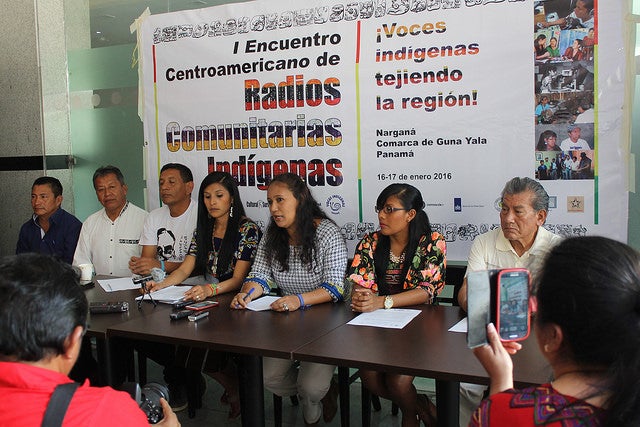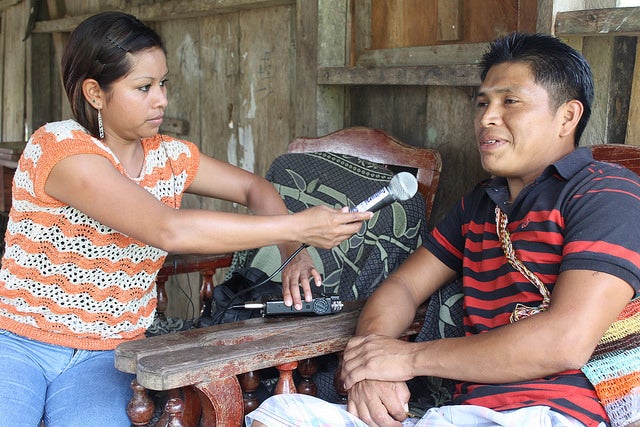Community Media
Cultural Survival supports Indigenous Peoples’ struggle in defense of their identities, lands, and human rights through Indigenous community-operated and controlled radio stations. This essential media creates, records and collects a regional narratives of Indigenous struggles and as well as connects regional efforts to advance social and gender equality for the Indigenous communities across the globe. Our programming reinforces self-determination, and facilitates proactive community engagement in defense of Indigenous Peoples rights.
Radio is a critical means of dissemination for news, information and entertainment in remote areas where choices for communication and media are limited. Cultural Survival supports Indigenous Peoples’ right to freedom of expression around the world to ensure that Indigenous Peoples have access to transparency, accountability, and participation in decision making.
Our cross programmatic emphasis on community media and the right to robust and diverse Indigenous media produced by and for Indigenous communities continues to promote and protect the cultural heritage of Indigenous Peoples, especially oral traditions and Indigenous languages.
Community Media Grants Project
"Indigenous Peoples' right to freedom of expression and information is the overarching goal of this initiative. The program's intent is to ensure target Indigenous communities have a viable and community controlled medium for dissemination of local and world news, information, community events, politics, and education. Community Radio provides access to information in extremely rural areas and for these communities serves as a tool for local organizing, cultural and language revitalization, educational opportunities, information on lands and natural resources issues, women's rights, and Indigenous rights," said Suzanne Benally, Executive Director of Cultural Survival.
Our experience shows there are significant barriers in the traditional grants process for Indigenous communities looking to organize and engage issues affecting their lives. Our Radio grant initiative is a nontraditional, dynamic grants and evaluation system that responds to the unique traditions, needs, and realities of Indigenous communities. Cultural Survival’s experience in Indigenous radio and community development informs us that an emergent, dynamic, and recursive process of developing, implementing, and revisiting goals and objectives based on community needs and influencing factors can happen only through a participatory framework.
The initiative will provide opportunities for international Indigenous community radio stations to strengthen their broadcast infrastructure and systems while providing training opportunities to their community journalists. Overall, the initiative will enhance community efforts to establish and ensure sustainability of Indigenous community-controlled media.
See our partners!
TBD
Regional Networks
 Indigenous community radio stations across many regions share common concerns and often have particular political and legal climates that require support and innovative strategies. Cultural Survival, our partners and the recently established network in Central America agree that regional networks can be a platform to share best practices and technical skills and develop political alliances and strategies to address current telecommunication laws that deny Indigenous communities access to radio frequencies and ensure legal recognition of Indigenous Peoples’ right to their own media. Regional networks also provide the opportunity for cultural and knowledge exchanges across areas, empowering Indigenous communities to focus on common issues while supporting and strengthening their individual efforts.
Indigenous community radio stations across many regions share common concerns and often have particular political and legal climates that require support and innovative strategies. Cultural Survival, our partners and the recently established network in Central America agree that regional networks can be a platform to share best practices and technical skills and develop political alliances and strategies to address current telecommunication laws that deny Indigenous communities access to radio frequencies and ensure legal recognition of Indigenous Peoples’ right to their own media. Regional networks also provide the opportunity for cultural and knowledge exchanges across areas, empowering Indigenous communities to focus on common issues while supporting and strengthening their individual efforts.
Cultural Survival supports the creation of these regional networks to develop the capacity of radio operators in production, journalism, and technical skills; training on gender equality, and in promoting women’s voices in media.
Highlight CA regional network leadership quote
Guatemala and Central America
Over 10 years of experience in Central America has enabled Cultural Survival to learn the immediate needs and constraints of Indigenous media and has positioned us to respond in meaningful ways. Over the past three years, Cultural Survival has provided a handful of small grants for equipment, trainings, staff support, and travel in response to the needs of our community partners in Guatemala, Belize, El Salvador, and Nepal.
ASC?
Indigenous Rights Radio
 Indigenous Rights Radio uses the power of community radio to inform Indigenous communities of their rights. In English, Spanish, and a growing array of Indigenous languages, we bring the voices of the Indigenous Peoples of Australia, Asia, Africa, Europe, and the Americas into dynamic dialogue about the meaning of Indigenous Peoples’ rights, their common struggles, and their innovative solutions to the problems they face.
Indigenous Rights Radio uses the power of community radio to inform Indigenous communities of their rights. In English, Spanish, and a growing array of Indigenous languages, we bring the voices of the Indigenous Peoples of Australia, Asia, Africa, Europe, and the Americas into dynamic dialogue about the meaning of Indigenous Peoples’ rights, their common struggles, and their innovative solutions to the problems they face.
Our Indigenous Rights Radio (IRR) Program is the only worldwide Indigenous community radio initiative that provides access to information on Indigenous Peoples rights and key international policies that impact Indigenous Peoples. Since then, an estimated 10 million Indigenous listeners receive IRR content annually. In more than 76 countries across the globe through our growing alliance of 1,500 Indigenous community radio stations.
Since the commencement of IRR in 2012, Cultural Survival has produced close to 1,000 programs in 33 languages, including 26 Indigenous languages, including short PSAs, interviews, and an hour-long documentary, on topics including:
- Free, Prior, and Informed Consent
- the 2013, 2014, 2015, and 2016 UN Permanent Forum on Indigenous Peoples Issues
- the 2013 World Conference on Indigenous Women
- the 2013 Continental Summit on Indigenous Communication in Oaxaca, Mexico
- the 2014 North American Indigenous Caucus Preparatory Alta Outcome Document
- the UN Declaration on the Rights of Indigenous Peoples
- the 2014 World Conference on Indigenous Peoples
- Community to community exchanges on Free, Prior, and Informed Consent in Peru, Panama, and Costa Rica
- the UN Declaration on the Rights of Indigenous Peoples
- 2015 and 2016 Expert Mechanism on the Rights of Indigenous Peoples
- the 2015 Indigenous Terra Madre conference and more
Cultural Survival is the only organization producing Indigenous rights radio programs from Indigenous perspectives, with wide-reaching, global distribution across an Indigenous network.
Click here to visit our IRR library.
Advocacy
The UN Declaration on the Rights of Indigenous Peoples establishes a framework for respecting Indigenous Peoples rights-- to their lands, lives, cultures, and the right to determine for themselves the future they will lead. So much work remains to be done to see the principles in this document respected across the globe. Many governments and companies ignore Indigenous Peoples voices–because they think no one will hold them accountable otherwise.
Cultural Survival’s Advocacy Program supports Indigenous communities around the globe by amplifying grassroots movements to bring awareness and international pressure to their struggles while enhancing Indigenous communities’ capacity, always at the invitation of community leaders, to demand and assert their rights outlined in the United Nations Declaration on the Rights of Indigenous Peoples. In addition to providing expert testimony on Indigenous, human and environmental violations and coordinating Indigenous participation at international bodies like the United Nations Permanent Forum on Indigenous Issues and the Expert Mechanism on the Rights of Indigenous Peoples (EMRIP) in Geneva, Cultural Survival’s Advocacy team coordinates reports to the Human Rights Council’s Universal Periodic Review.
Cultural Survival’s advocacy work supports grassroots Indigenous movements as they put pressure on governments and corporations to protect, respect, and fulfill the rights of their communities. We support Indigenous communities who are tirelessly doing work on the ground to hold their governments accountable.
Selected Campaign Highlights
Peru: Pluspetrol's concession on Lot 192 expired at the end of August 2015 after 40 years and a new concession is being authorized to Canadian petroleum company Pacific Stratus, despite consultation and dialogue being officially broken off with Indigenous Peoples by the state after agreements could not be reached. Quechua and Achuar Communities held 12 days of strikes shutting down all oil operations until meetings with government resumed. Unfortunately, the concession will move forward for the next two years.
Bangladesh: The Phulbari mine in Bangladesh continues to be stalled thanks to the vigilance of local communities who hold massive protests anytime company employees step foot in their village. The delay to the project has caused the company’s stock to continue declining, and the project is not likely to move forward in the near future.
Bazaars
Cultural Survival Bazaars are annual celebrations of Indigenous arts, music, and cultures from around the world. Presented in New England since 1982, these events feature Indigenous artists, community cooperatives, and performers selling their handmade artwork, demonstrating their craft skills, and performing music from their traditional cultures. Our Bazaars support sustainable livelihoods for Indigenous artists. In 2015, Cultural Survival’s bazaars impacted over 1,000 Indigenous artists spanning five continents and 50 countries and generating more than $220,000 in real revenue for our vendors.
Click here to see dates of upcoming Cultural Survival Bazaars!
